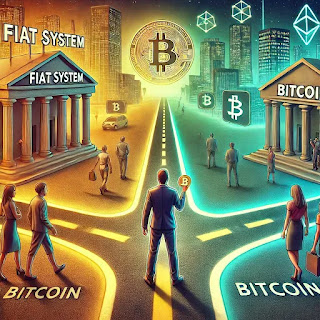From Empire to Protocol: Why Bitcoin Is the Peaceful Revolution That Ends All Wars
Throughout history, revolutions have been bloody. Empires rise and fall on the backs of war, rebellion, and conquest. Kings are overthrown. Dictators are toppled. Governments are burned to the ground only to be replaced by something just as corrupt. The pattern is clear: violence begets more violence. Oppression is simply repackaged with a new logo. And the cycle continues.
But what if we could break the cycle? What if the next revolution doesn’t come with pitchforks and protests, but with private keys and code?
Bitcoin isn’t just a new form of money. It’s the world’s first peaceful revolution-a system that lets people walk away from broken empires without firing a shot. No more coups. No more bloody uprisings. No more tearing down. Just quiet, voluntary exit.
It doesn't storm the castle. It ignores it. It builds something better, open, incorruptible, and available to anyone. And it doesn't need to make demands, because it already works. Bitcoin’s simplicity is its strength: a fixed supply, a predictable issuance, and an open ledger that belongs to no one yet serves everyone.
Empires have always been powered by centralized money and force. From Rome to the British Empire to the modern dollar-dominated world, monetary control has been the lever of global dominance. Wars are not won with ideals—they’re funded with inflation. Governments print money, tax citizens, and issue debt to finance their militaries. War and fiat are bedfellows. You can’t have one without the other.
Even now, every major conflict is underpinned by fiat power. Sanctions, central bank decisions, and endless debt fuel geopolitical chess games. It’s not about freedom. It’s about control. The illusion of choice packaged in flags and anthems.
Traditional revolutions try to wrestle control away. But they rarely change the system itself. One regime is toppled, another takes its place. The faces change, but the structures stay the same. The money is still printed. The people are still taxed. The wars go on. You can’t solve systemic rot by swapping out the figurehead.
Bitcoin doesn’t want to overthrow. It wants to obsolete. It doesn’t call for violence. It calls for verification. It doesn’t demand your allegiance. It offers an alternative. A silent protest in code.
There’s no army. No political party. No headquarters. Just nodes, miners, and wallets scattered across the globe. It’s not led—it’s run. And it’s not enforced, it’s chosen. This is what makes it revolutionary.
Bitcoin doesn’t tear down. It builds parallel. It says, “We don’t need to destroy your empire. We just don’t need to live in it anymore.” It’s the ultimate opt-out. You’re free to stay in the fiat system if you want. But you don’t have to.
This changes everything. When you don’t need permission to leave, the power dynamics shift. Suddenly, participation is voluntary. And voluntary systems must compete. They must earn trust. They must offer value. They can’t rule by fear.
The beauty of Bitcoin is that it doesn't try to fix the legacy system; it allows you to exit it. It introduces accountability where none existed. It gives the powerless an equal footing. And it does it all without taking a single life. Instead of revolutions fueled by rage, this one is fueled by reason. Instead of mobs, we have miners. Instead of banners, we have blockchains.
Without a central bank to endlessly print money, the ability to fund wars disappears. You can’t wage a 20-year occupation if you can’t borrow from the future. Bitcoin forces accountability. You can’t hide budget shortfalls under a layer of quantitative easing. You can’t quietly devalue a population’s savings to fund another drone strike. Every sat is accounted for. Every transaction is time-stamped. Every coin is finite.
Bitcoin rewires the incentive structure of civilization. It rewards long-term thinking. It punishes recklessness. It favors saving over spending, cooperation over coercion. In a world of hard money, peace becomes profitable.
And the best part? It spreads without violence. There’s no missionary force. No political campaign. Just word of mouth. Education. Curiosity. A shared realization that something about the current system is broken—and there’s a better way.
This revolution isn’t waged on battlefields. It happens at kitchen tables, on podcasts, in Telegram groups, and through whispers between friends. It’s not televised. It’s mined.
It doesn’t ask for your vote. It asks for your attention. And when you give it, everything changes.
Empires fall because they rot from within. Bitcoin doesn’t need to destroy them; it only needs to survive long enough for people to walk away. It is the quiet default. The soft opt-out. The final peaceful rebellion.
So maybe the end of empire doesn’t look like fire and fury. Maybe it looks like a billion people securing their wealth with twelve words. Maybe it looks like transactions being confirmed every ten minutes on a global network no one can stop.
Maybe the most powerful revolution of all... is the one you don’t see coming.
Tick tock, next block.




Comments
Post a Comment